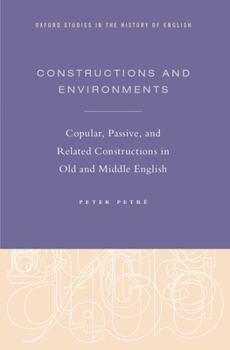Constructions and Environments: Copular, Passive, and Related Constructions in Old and Middle English
This monograph presents the first comprehensive diachronic account of copular and passive verb constructions in Old and Middle English. Peter Petr analyzes: - The mysterious loss of the high-frequency verb weor an 'become' as a casualty of changing word order in narrative during Middle English.
- The merger of is 'is' and bi 'shall be, is generally' into a single suppletive verb, and how it is related to the development of a general analytic future shall be.
- The co-occurrence of multiple changes that led to become and wax crossing a threshold of similarity with existing copulas, from which they analogically adopted full productivity in one fell swoop. In explaining each of these changes, Petr goes beyond the level of the verb and its complements, drawing attention to analogical networks and the importance of a verb's embeddedness in clausal and textual environments. Using a radically usage-based approach, treating syntax as emerging from (changing) frequencies, Petr draws attention to general principles of constructional change, including but not limited to grammaticalization and lexicalization. He proposes novel parallelisms between linguistic and ecological evolution. Going beyond the view of language change as propagating only in social interaction, Petr explains how each individual's mental grammar can be seen as a dynamic ecosystem with hierarchical environments (clausal niches, textual habitats). In this view, the interconnectedness of seemingly unrelated changes, itself resulting from cognitive economy principles, is arguably more decisive in lexical change than is functional competition.
- The merger of is 'is' and bi 'shall be, is generally' into a single suppletive verb, and how it is related to the development of a general analytic future shall be.
- The co-occurrence of multiple changes that led to become and wax crossing a threshold of similarity with existing copulas, from which they analogically adopted full productivity in one fell swoop. In explaining each of these changes, Petr goes beyond the level of the verb and its complements, drawing attention to analogical networks and the importance of a verb's embeddedness in clausal and textual environments. Using a radically usage-based approach, treating syntax as emerging from (changing) frequencies, Petr draws attention to general principles of constructional change, including but not limited to grammaticalization and lexicalization. He proposes novel parallelisms between linguistic and ecological evolution. Going beyond the view of language change as propagating only in social interaction, Petr explains how each individual's mental grammar can be seen as a dynamic ecosystem with hierarchical environments (clausal niches, textual habitats). In this view, the interconnectedness of seemingly unrelated changes, itself resulting from cognitive economy principles, is arguably more decisive in lexical change than is functional competition.
Format:Hardcover
Language:English
ISBN:0199373396
ISBN13:9780199373390
Release Date:July 2014
Publisher:OUP Us
Length:320 Pages
Weight:1.20 lbs.
Dimensions:1.2" x 6.4" x 9.3"
Related Subjects
Language ArtsCustomer Reviews
0 rating





